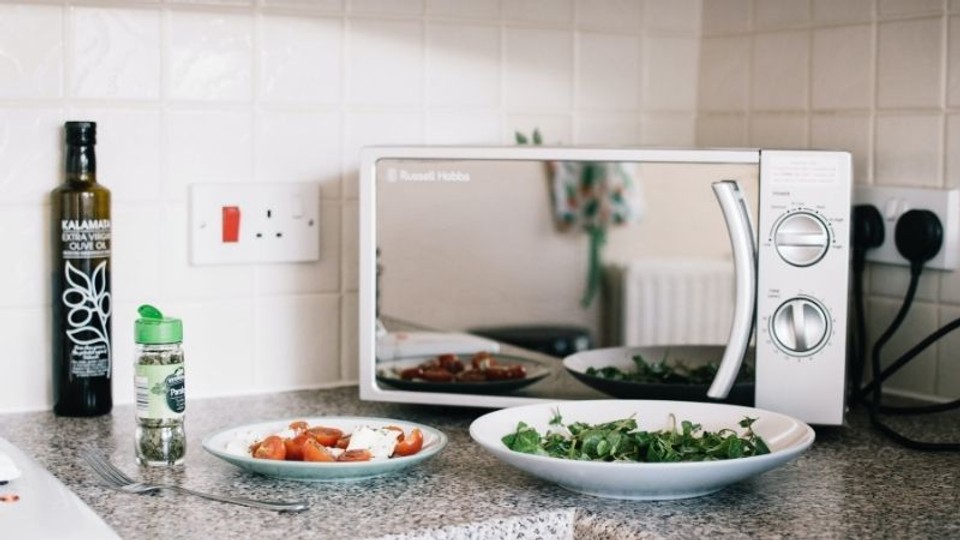
Arguably one of the best things about meal prep is your ability to whip up a healthy, nutritious meal in just minutes. All you need to do is poke a few holes in the film, chuck your meal in the microwave and wait for the ding! But, does your food maintain its nutrition after microwave heating?
As you might already know, there’s no getting around losing at least some of the nutrition during the conventional cooking process. When the food is heated to a certain temperature, the chemical structure of the nutrient is broken down and damaged, leaving you with sometimes less than half the nutrient content you started with.
When you see meal providers raving about the amount of nutrients present in each of their meals, it’s unclear as to whether this is before or after the food is zapped in the microwave. To find out more about how microwaving affects our food, we spoke with accredited senior company Dietitian for Jenny Craig, Karen Stafford.
Are microwavable meals as nutritious as fresh meals?
With healthy, frozen microwave food taking pride of place in their very own frozen section of our supermarkets, it’s easy to assume that these meals may in fact offer a higher nutritional content than meals cooked with fresh produce from home. Ms Stafford said although these meals are frozen to maintain their integrity and nutrition, not all frozen microwave food is necessarily better for you.
“Pre-prepared frozen meals can be a great option for those who need quick, convenient meal options, and who may otherwise turn to less nutritious ones. Most frozen meals are blast frozen, meaning their nutrients and quality are retained. While not all pre prepared meals are created equal, at Jenny Craig we offer nutritionally balanced, portion-controlled meals that are prepared with fresh ingredients and blast frozen, locking in their flavour and nutrition. What’s more, frozen meals can also help to reduce food waste as you only use what you need, making it cost effective.”
Are certain foods more likely to be affected than others?
That being said, we need to make sure the way we are cooking our food is conducive to the microwave cooking method. This could mean some food you cook conventionally, while others are still nutritious when cooked in the microwave correctly. According to Ms Stafford, there is definitely an art to microwave cooking and methods you should avoid such as boiling vegetables, to ensure you aren’t stripping the food of its nutritional value.
“Foods that are cooked for very long periods and cooked in water, particularly vegetables are more susceptible to nutrient loss. So, where possible try to avoid overcooking or boiling. Microwaving for a shorter time can help lock nutrients in that may be lost through boiling or poaching,” she said.
Which foods are best for microwaving?
Although cooking in the microwave is fairly self-explanatory, not all food will cook in the same way for the same amount of time. Understanding the food you are dealing with and understanding reasonable food safety precautions, along with the type of microwave oven you are using is crucial to a successful microwaved meal. There is no specific type of food which is better for microwaving, however, there are definitely foods you must cook extremely carefully to make sure you are eliminating any potential for bacterial contamination.
For example, if you are cooking a meal with raw meat in the microwave as opposed to a microwave safe meal, you will need to ensure the food reaches a particular temperature that is considered safe for eating. Traditionally, beef, pork and lamb should reach 62 degrees Celsius, while poultry should reach at least 74 degrees Celsius and ground meats should reach 72 degrees.
For all other fresh and frozen food, it is definitely helpful to follow the instructions on the packet or from the microwave manual when reheating to make sure the food is being cooked all the way through.
“Most foods are suitable for heating in a microwave; including pre prepared meals and vegetables. Just be sure to follow the heating instructions and ensure foods are heated all the way through. You may need to check the wattage on your microwave to ensure you are heating foods at the correct temperature and for the correct amount of time,” said Ms Stafford.
Does microwaving affect the nutritional value of food?
So, the big question is, does microwaving effect the overall nutritional value of our food in comparison to cooking in a conventional oven? Ms Stafford believes that surprisingly, microwaved meals could actually be beneficial to our health.
“Microwaving has little effect on the nutrient composition of food. When you cook food by any method, some nutrition will naturally be lost from the food and some methods will cause more loss than others. For example; boiling veggies in water can lead to a loss of nutrients in the cooking water. The advantage of microwaving is a shorter cooking time meaning that less nutrients are lost in the cooking process. Using a microwave to cook food can actually help people eat more nutritious foods rather than turning to less nutritious fast or convenience foods, as it’s a quick, convenient way of heating food and meals.”
So, I think it’s safe to say that microwaving your food, although convenient and almost too easy to be true, is in fact an extremely healthy way to cook your food without stripping your ingredients of their nutritional value.




